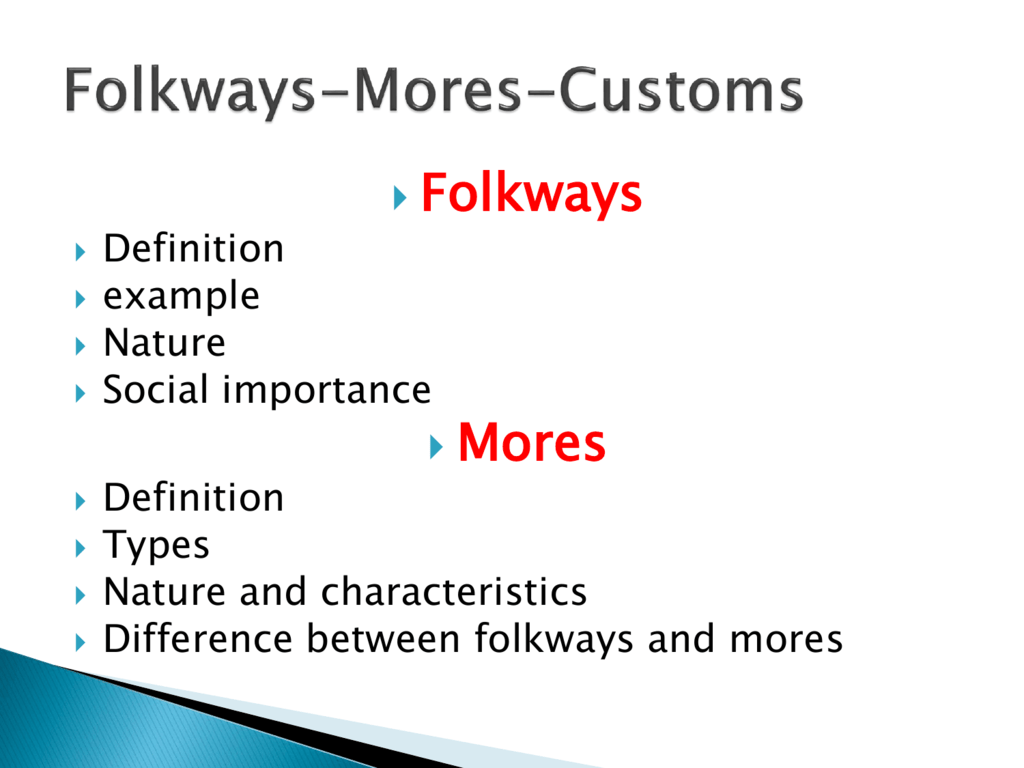Have you ever noticed how people stand in line at the grocery store, but no one explicitly tells you to do it? Or how you intuitively know to cover your mouth when you sneeze, without needing a rule book? These seemingly trivial behaviors, deeply ingrained in our societies, are prime examples of folkways, the unwritten social rules that guide our everyday lives.

Image: studylib.net
Folkways, a term coined by sociologist William Graham Sumner, are the informal norms that govern social behavior. Unlike formal laws or mores (strict moral rules), folkways carry minimal consequences for violation. Yet, they play a crucial role in shaping our social interactions and providing a framework for understanding expected behavior. In this article, we’ll explore various aspects of folkways, delving into their significance, examples, and the ever-evolving nature of these social customs.
The Significance of Folkways
Providing Social Order
Think of folkways as the invisible glue that holds society together. They provide a sense of predictability and order, allowing individuals to navigate social situations with ease. For example, the folkway of saying “please” and “thank you” promotes politeness and respect, fostering smoother interpersonal interactions.
Facilitating Group Identity
Folkways contribute significantly to group identity. Shared customs and traditions, often passed down through generations, reinforce a sense of belonging and differentiate one group from another. In a globalized world, folkways can sometimes create subtle cultural boundaries that impact interactions between people from diverse backgrounds.

Image: childhealthpolicy.vumc.org
Evolving with Time and Context
One of the fascinating aspects of folkways is their dynamic nature. They are not static rules set in stone but rather fluid social constructs influenced by societal changes, technological advancements, and shifting values. For instance, the folkway of shaking hands as a greeting has evolved over time, with non-contact greetings becoming more prevalent due to concerns about hygiene and disease transmission.
Folkways in Action: Real-World Examples
Folkways are all around us, influencing our behavior in countless ways. Here are some examples to illustrate their pervasiveness:
Table Manners:
From using utensils to chewing with our mouths closed, table manners are a set of folkways that shape how we eat in public. Violating these unwritten rules can lead to social disapproval, though not necessarily formal sanctions.
Dress Codes:
The clothes we wear are often guided by folkways. Specific dress codes for different events, such as weddings or funerals, signal respect and appropriateness. Casual Fridays, a modern folkway, reflect a shift in workplace culture towards a more relaxed environment.
Greetings and Conversation:
The ways we greet each other, the topics we discuss, and the level of formality we maintain are all influenced by folkways. From shaking hands to exchanging small talk, these seemingly simple interactions are encoded with social meaning.
Personal Space:
Folkways dictate the appropriate amount of personal space we maintain. Standing too close to someone can be interpreted as intrusive, while standing too far away can signify disinterest or alienation. These unspoken rules help us navigate social interactions without causing discomfort or offense.
Technology and Folkways:
In the digital age, folkways have extended to online interactions. Netiquette, the set of folkways governing online behavior, dictates proper ways to communicate in emails, chatrooms, and social media. The rise of emojis, for example, has created new folkways around emotional expression in digital communication.
The Power of Folkways: Shaping Society and Individual Behavior
Folkways, though often unnoticed, hold considerable power in shaping our social worlds. They impact our everyday interactions, influencing our sense of belonging, our understanding of what’s acceptable, and our behavior in various settings. By observing and understanding the folkways of different cultures, we can navigate the complexities of social life with greater sensitivity and empathy.
Evolving Folkways: Reflections of Changing Societies
As societies evolve, so do their folkways. The changing role of gender, the increased emphasis on inclusivity, and the impact of globalization are all contributing to shifts in the unwritten rules that guide our behavior. For instance, the rise of gender-neutral pronouns and the adoption of new greetings that acknowledge cultural diversity reflect a growing awareness of inclusivity in modern societies.
Navigating Folkways Across Cultures: A Cross-Cultural Perspective
Traveling to different countries or interacting with people from diverse backgrounds can present a fascinating challenge: navigating a spectrum of unique folkways. Gestures, greetings, and even the way we convey emotions can vary significantly from culture to culture. For instance, what’s considered polite in one culture might be considered rude in another. Understanding these variations is crucial for building positive relationships and fostering cross-cultural understanding.
Folkways: A Constant Source of Learning and Adaptation
Folkways, as a dynamic reflection of our social fabric, provide a constant source of learning and adaptation. By being mindful of the unwritten rules that guide our interactions, we can be more sensitive to the norms of different communities, improve our communication skills, and build stronger social connections. As societies continuously evolve, observing these evolving folkways is a valuable way to gain deeper insights into the complexities of human behavior and the ever-changing landscape of social interactions.
Folkways Sociology Examples
Conclusion
Folkways, the seemingly trivial yet powerful unwritten rules of society, play a crucial role in shaping our social interactions, fostering order, and contributing to group identity. While they may not carry the same weight as formal laws, understanding these unspoken norms is essential for navigating social situations effectively, building meaningful relationships, and fostering cross-cultural understanding. As we encounter diverse communities and navigate a world in constant flux, recognizing the importance of folkways empowers us to interact with others more thoughtfully, promoting harmony and connection within an ever-changing social landscape.






